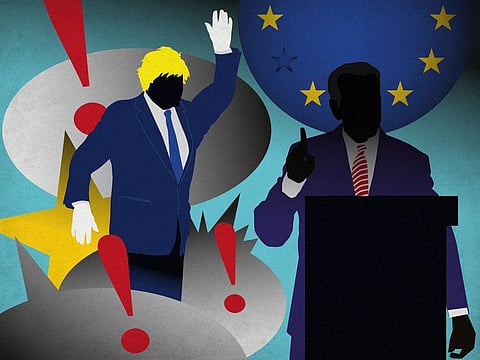Boris Johnson needs to change his act
UK government should augment its soft power and use hard power carefully and responsibly

Some of the United Kingdom’s right-wing press — supporters of both Brexit and its principal advocate, Prime Minister Boris Johnson — have been quick to assure us that US President Joe Biden will want to do business with a UK that is now distanced from the European Union and ready to assume a new role as an influential global fixer.
Let’s hope those newspapers are correct. But Biden and his team will have to overlook quite a lot for the sake of such transatlantic goodwill. They will certainly have to turn the other cheek and forget about the UK government’s embrace of a policy that required special pleading to Trump rather than a special relationship with the United States.
That dispiriting story began with an embarrassed-looking Theresa May, Johnson’s predecessor, being told that the UK’s national interest required her to get along with Trump.
May was even prevailed upon to invite him to Britain for a sort of semistate visit, without a carriage ride through London with the Queen but including a speech to both Houses of Parliament.
The then-Speaker of the House of Commons, John Bercow, saved Parliament’s dignity by vetoing this idea, a decision for which he was widely criticised. Bercow now deserves some apologies from those who doubted his ability to detect a rogue.
More substantive issues
May, a decent and honest woman, was far outdistanced by her successor and his colleagues in the Trump sycophancy stakes. In January 2017, Johnson’s senior fellow Brexiteer and principal ministerial fixer, Michael Gove (a former journalist with The Times newspaper), conducted an interview with then President-elect Trump.
But Johnson has more substantive issues to try to explain away or forget as he seeks to build good relations with Biden. His problem is not just the contrast between what he wrote and said about Trump and his Democratic predecessor, Barack Obama (under whom Biden served as vice president). What really matters is what Johnson stands for and the way he behaves, which inevitably invite comparisons to Trump.
If the US-UK relationship is to be as close and productive as all who believe in liberal democracy should want, Johnson must change three aspects of his approach.
First, Johnson has — to put it politely — a rather distant relationship with the truth. But as the Yale historian Tim Snyder has pointed out, post-truth politics can easily drift into something far more dangerous and sinister, particularly on the back of social media.
Two, Johnson and most of his Brexit colleagues have tried to pillory Britain’s renowned public broadcaster — the BBC — for its efforts to provide balanced news coverage. In any liberal democracy, majoritarianism needs to be checked and balanced by the very institutions that Conservative ministers and the right-wing press have rubbished.
Stamp of English nationalism
Third, Johnson’s government reflects too many aspects of Trumpian nativism. His government bears the stamp of English nationalism like the words embedded in a stick of seaside rock (a hard, sugary candy sold at British coastal resorts).
We British are outside the EU now and must make the best of this choice. But leaving Europe is an impossibility, because we remain geographically, economically, politically, and culturally part of it.
We must work with our European friends — our closest neighbours and largest trade partners — in order to advance our national interest and show others that we understand how to cooperate on the international stage.
Above all, the UK needs to show a grasp of the disciplines and manners of partnership, whether we are trying to augment our soft power or use our hard power carefully and responsibly. The habit of cooperation is indispensable, whether we are addressing trade, security, or the environment.
To convince the Biden administration at meetings like the planned G7 summit in June and November’s COP26 climate-change conference (both of which the UK will chair), we should first demonstrate that we are not reckless.
After all, taking cheap shots at your friends damages you more than it does them. And they will remember the patronising insults when you next ask for their assistance.
The Johnson government has to show that it can be an effective partner.
Chris Patten, the last British governor of Hong Kong and a former EU commissioner for external affairs, is Chancellor of the University of Oxford.
Project Syndicate






